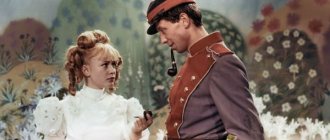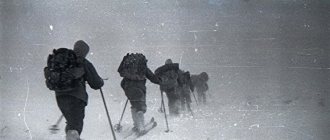Views: 1,839
Ekaterina Fedorovna Savinova is a talented Soviet actress with a short and tragic biography. She was remembered by the viewer in the leading role of Frosya Burlakova in the film “Come Tomorrow”. Unfortunately, this work turned out to be her only significant role in cinema. Life treated Savinova cruelly: her film career was destroyed at the very beginning, and an absurd accident led to a serious mental disorder, which caused death at the age of 43.
Ekaterina Savinova. Photo m.yandex.ru
Ekaterina was born on December 26, 1926 in the village of Eltsovka, Altai Territory, into a simple peasant family. After graduating from school, she came to Moscow to enter VGIK , but her first attempt was not successful. After some time, the girl managed to get into an additional course directed by Vasily Vanin , from which she was soon expelled “due to lack of acting skills.” But Ekaterina persistently pursued her goal and in 1945, having overcome a huge competition, she was admitted to VGIK in the workshop of directors Boris Bibikov and Olga Pyzhova . Nonna Mordyukova and Vyacheslav Tikhonov studied with her .
After graduating with honors from the course, the young actress entered the “Gnesinka” vocal department, because In addition to her acting talent, she also had a unique voice. Savinova could have had a brilliant singing career - she was invited to both the Bolshoi Theater and the stage, but Ekaterina wanted only one thing: to act in films. She refused.
How Katya became a “Kuban Cossack”
In 1950, Savinova entered the service of the Film Actor Studio Theatre, but continued to dream of cinema. Her debut in cinema was the role of Lyubochka in the film “Kuban Cossacks” by the famous director Ivan Pyryev , in which she starred in her final year at VGIK.
Lyubochka. “Kuban Cossacks” 1949
The actress was noticed by both spectators and directors, but... Ivan Pyryev was famous for both his love of love and vindictiveness. He made an unequivocal proposal to Catherine, to which the girl responded with a slap in the face. This incident put an end to her film career. Savinova was far from the only one whose creative destiny was destroyed by the all-powerful director.
Ivan Pyryev. Photo by autogear. ru
The list was continued by his ex-wife Marina Ladynina, Clara Rumyanova, Iya Arepina...
Ekaterina was invited mainly to minor roles, which sometimes were not even listed in the credits. It happened that interesting offers were received and she was even approved for the role, but at the last moment the actress was refused. This happened, for example, with the role of Maryutka in the film directed by Grigory Chukhrai in “The Forty-First” . Maryutka was eventually played by Isolda Izvitskaya, who received numerous awards for this work. Savinova was very upset about her lack of demand, but believed that she would still act in leading roles.
Russian Greta Garbo
She was born on June 11 (24), 1908 in the village of Nazarovo, Yenisei province, in a distant Siberian village. Father - Alexey Dmitrievich, had three classes of education. Mother, Maria Naumovna, had no education.
Marina Ladynina photography
There were four children in the family, and Marina, as the eldest of the children, early learned the difficult life of the village.
She had to clean, wash, and rinse large clothes in an ice hole, and carry water from the river on a yoke. She also worked for hire: in the summer, she milked 10 cows daily for a local farmer. In winter, the parents sent their daughter to study in another village, since there was no school in her native village. Since childhood, the girl had two hobbies: books and the stage. Having learned to read early, already from the 2nd grade she was considered the best storyteller in school and therefore acted as a prompter in school plays. Dreaming of becoming an actress, she played all the roles of the play in the prompter's booth. Usually the play captivated her so much that, forgetting herself, the girl began to play herself, pronouncing the characters’ lines with such feeling and strength that her voice could be heard in the audience. For which she often received punishment from the director of the performance: “Look, Ladynina, I’ll kick you out - it’s painful to hear you!” And from then on, the children began to tease her about being an artist. Next - participation in amateur performances in the roles of boys and girls. In the 7th grade, at the Pushkin anniversary party, Marina superbly played her first adult role - Natasha in “Rusalka”, receiving her mother’s approval. The mother’s character was strict and domineering, and the work of an actress seemed worthless to her. A meeting with the provincial actress Baratova in the play “Judushka Golovlev” on the stage of the Achinsk Drama Theater, where Ladynina played along with her in the role of her younger sister, finally confirmed her in the need to study real art. Advertising:
Ladynina graduated from 9th grade with a pedagogical focus in the city of Achinsk and at the age of 15 became a rural primary school teacher. Since January 1925, she taught in the Siberian village of Nazarovo. In addition to school and social work, she actively participated in amateur performances. She sang in concerts, performed in amateur performances, and lived the role of her heroines. It was then that her talent was noticed. Thus began Ladynina’s path to great art.
Marina Ladynina photography
To be closer to the center of culture, she moved from a Siberian village to the Smolensk province, her father’s homeland. She taught at school and worked in a nursery in the summer. I dreamed of Moscow, of theater schools, of a future that must be conquered at all costs. An artist from the Meyerhold Theater, Sergei Fadeev, once came to the Smolensk village on vacation. They met. Seeing the makings of an actress in her, he left her the address of GITIS, and most importantly, gave her a book by K.S. Stanislavsky “My Life in Art”, advising me to prepare for the exam. Ladynina prepared Katerina's monologue from Ostrovsky's The Thunderstorm.
Fate smiled at her: in 1929, on a permit from the volost Komsomol committee, Ladynina was sent to Moscow to enter the Faculty of Social Sciences. However, she went to GITIS to enroll. The examination committee included such masters as A.P. Petrovsky, I.M. Moskvin, M.M. Tarkhanov S.G. Birman. On the examination sheet, the commission made a note: “Particularly gifted.”
Marina Ladynina photography
A time of intense study began under the guidance of experienced teachers and leading directors of Moscow theaters. Ladynina’s favorite teacher was the Honored Artist Andrei Pavlovich Petrovsky. In her 2nd year, Ladynina got an internship at the Moscow Art Theater, where she was immediately noticed, contracted, and given a Moscow Art Theater scholarship of 75 rubles. This guaranteed that immediately after graduation she would become an actress at the Moscow Art Theater. One could only dream about this.
After graduating from the institute, Ladynina remains at the Moscow Art Theater and works there for 5 years. In February 1934, the premiere of Gorky's play “Yegor Bulychev and Others” took place.
Marina Ladynina photography
One of the first significant roles on the dramatic stage was Taisiya in the premiere performance, where Ladynina played a fragile nun rebelling against hypocrisy and falsehood. The young actress was noticed. Meeting with K.S. Stanislavsky lasted three hours, and as a farewell instruction, the following was said: “Work, regardless of whether there is a role or not. At any time when called you should be ready to read something new. Otherwise I’ll be angry.” Playing the role of Tanya in the dramatized story by A.M. Gorky's "Twenty Six and One" directed by V.I. Nemirovich-Danchenko, the young actress was infinitely happy when she heard praise from Alexei Maksimovich Gorky. Together with B. Dobronravov, scenes from Ostrovsky’s “The Marriage of Belugin” were prepared.
Best of the day
| John Argyropoulos Visits:274 | Polina Vitorgan Visited:271 | The last Russian emperor Visited: 265 |
While still a student at GITIS, she began acting in films. Her film debut took place in 1931. At the invitation of director Yu. Zhelyabuzhsky, she played the episodic role of a blind flower girl in the film “Prosperity”. Playing on the Moscow Art Theater stage, Ladynina accepted an invitation to the main role in the film “Enemy Paths” (directed by I. Pravov and O. Preobrazhenskaya), where her partners were B. Tenin, I. Lyubeznov, A. Abrikosov, E. Tsesarskaya. I had to go to V.I. Nemirovich-Danchenko and ask permission to act in films. Vladimir Ivanovich agreed, noting that her place was a theater stage. In 1935, directed by Bilinsky, Ladynina played the heroine in the film "Outpost at the Devil's Ford", although the film was not released.
Marina Ladynina photography
In this film, Ladynina for the first time fully experienced her work in a great and new art for her. Natural naturalness, organicity, and inner freedom helped Ladynina feel natural in front of a movie camera, as well as on stage, which is not possible for all theater actors.
1936 – meeting with the talented director Ivan Pyryev. An excellent actor, director, endowed with great talent, he had a great sense of the nature of cinema, possessed an unprecedented, fantastic energy that overwhelmed him and charged everyone around him. And all this influenced the life and fate of Marina Ladynina.
Marina becomes Pyryev's muse, his main actress, for whom he writes roles, with whom he stages a series of musical comedies. She always had a lot of vitality, talent and thirst for activity. Ivan Pyryev built his cinema on this, full of joyful life affirmation.
Marina Ladynina photography
Pyryev knew how to see the ideal beginning in everyday situations; he made his films with the goal of entertaining and distracting the audience, immersing them in the world of the holiday. Ladynina also knew how to do something that few artists can - to give a completely detached image, fabulous, musically complete, self-sufficient. It only needed to be framed, placed in the scenery of the Mosfilm pavilions, and sounded with the wonderful music of I.O. Dunaevsky and T.N. Khrennikova.
Marina Ladynina photography
In 1938, the film “The Rich Bride” was released.
At first, the young talented Kiev writer Arkady Dobrovolsky worked on the script together with Evgeny Pomeshchikov. He was arrested and sent to a camp. Marina Alekseevna, whose life was then in full view, did not leave Dobrovolsky in trouble. She secretly sent packages to the camp, which probably helped the prisoner survive in many ways. He wrote: “In addition to the fact that your name shines through the thickness of the mines, consider that with your letters you are lighting a candle in front of the icon so that this punishment will pass you by.” After his release, 25 years later, he came to Marina Alekseevna, knelt at the threshold and said: “I swore to myself that the first person I would come to when I was free would be you.”
With the role of the mischievous collective farmer Marinka Lukash in the film “The Rich Bride,” Ladynina gained national fame. The film is filled with humor and fun. Fitting perfectly into the glossy idyll of Pyryev’s films, Ladynina at the same time retained her personal beginning. She played with passion, but did not completely merge with her heroine; the viewer always remembered that he was seeing Marina Ladynina, and not just the pig farmer Glasha or the tractor driver Maryana. It is precisely this distance between the screen image and the personality that makes up Ladynina’s art.
In 1939, the film “Tractor Drivers” was released, where Ladynina played the role of foreman of the best women’s tractor brigade in the area, Maryana Bazhan. Ivan Pyryev recalled about the actress’s hard work: “I was lucky with the actors. Marina, for example, had to fly across the steppe on a motorcycle and drive a complex caterpillar tractor through plowing. In the film “Tractor Drivers,” the actress did all this as if she had already been a tractor driver for a long time and had repeatedly participated in motorcycle racing.” But behind the dashing maneuvers of the foreman or chairman, a soft femininity, perky, but also shy, was always mockingly visible. This is how Marina Ladynina’s fighting girls differed from other similar fighting girls on the screen in the 1930s and 1940s. The tenderness and grace of the actress softened the stormy social temperament and the agitational onslaught of Pyryev’s fantasies. She made fun of herself, her heroine, and the audience a little - and this was her special, sweet and graceful comedy.
1940 - the film “Beloved Girl” based on the script by Pavel Nilin. The heroes of the film are young representatives of working dynasties. Ladynina in the role of Varya Lugina is truthful and attractive.
The pinnacle of Ladynina’s fame was her difficult but beloved role as Glasha in the film “The Pig Farm and the Shepherd.” This is a film with a special destiny. It began to be filmed on the eve of the war, and was completed in October 1941, and it became a mascot for front-line soldiers. He was intercepted from each other by units on the front line, and none of the soldiers knew whether he would be alive tomorrow, but the battle was tomorrow, and today was a session in the trenches. Love story - “...if Moscow made us friends.” One land, for which they fight with tanks and grenades, and on the screen - the love that united the collective farmer Glasha from the North and the shepherd from the Caucasus. The film shows pure love that overcomes all obstacles. And with what amazing warmth the actress played the pig farmer Glasha!
1942 - the film “Secretary of the District Committee”, where the actress played the role of Natasha, a radio operator of a partisan detachment. This film gave birth to even greater hatred of the enemy in the hearts of our people, among the soldiers at the front, and called them to battle.
1942 - the film “Antosha Rybkin” based on the script by A. Granberg (directed by K. Yudin. Ladynina played the role of an actress.
Six months before the Victory, in 1944, the wonderful film “At 6 pm after the war” was released. This is a lyrical poem that tells viewers how, in harsh years, people knew how to remain faithful, love and great hope for a joyful meeting after the war.
In 1946, the actress went abroad for the first time as part of the Soviet delegation to the Cannes Film Festival. France stunned her.
1947 - the film “The Tale of the Siberian Land”. Filming took place in Czechoslovakia. The country was returning to peaceful labor. The film touches on a serious topic - creativity. The picture corresponded to the mood of the time. Ladynina played the role of singer Natasha Malinina touchingly, with soft lyricism. The film was a success. The film was in theaters for a long time both in our country and abroad.
1949 - the film “Kuban Cossacks”. Ladynina - in the role of the chairman of the collective farm “Zavety Ilyich” Galina Ermolaevna Peresvetova, a decisive, businesslike, firm and at the same time spiritual, responsive woman, living not only with the worries and anxieties of the post-war village, but also with inexhaustible faith in the future. The film was a huge success, songs from it are still sung by our people. After the release of the film “Kuban Cossacks”, the actress received a huge number of grateful letters from fans, but completely unexpected was a letter from a 6th grade student from the city of Baku, in which he addresses “the chairman of the collective farm Galina Ermolaevna Peresvetova”: “I wanted to Your collective farm, where you can work. I watched the movie “Kuban Cossacks”, and I liked the collective farm life in which you live... This is how I talk about your collective farm, which I have not been to: “Where people work, where it’s fun to live. Where you need to work, where you can love.” I want to go to your collective farm. There are three of us at home - me, my grandmother and my mother. My mother will work as an accountant, my grandmother will work as someone in the field, I will study to be a tractor driver.”
In 1950, Ladynina was awarded the title of People's Artist of the USSR.
1951 - the film “Taras Shevchenko” (the episode was not included in the final version).
1954 - the film “Test of Loyalty” became a landmark, turning point and last for Ladynina in her creative biography. The heroine of the film, Olga Kalmykova, was going through a serious drama - her husband left her. How can you pass this test without losing your dignity, without breaking down? The role was difficult, but, according to the actress, it brought her great creative joy.
M.A. Ladynina remained for all generations an actress who created the image of a Russian woman - strong in spirit and will, unrestrained in work and ardent in love, sweet, charming, sparkling, like a dream, but a dream that can become reality.
The actress's interest in life helped her remain herself. After leaving the set, she joined the troupe of the Moscow Theater and Film Actor Studio. She played Bogaevskaya in M. Gorky’s “Barbarians” subtly, gracefully, unexpectedly. She played Maria Nikolaevna in K. Simonov’s play “Russian People”.
For Ladynina, the main thing in life was to feel the joy of creativity. Concerts and poetry became her world. I took vocal lessons from a wonderful teacher, Nina Razumova.
Among the actress’s friends were F. Ranevskaya, N. Cherkasov, L. Ruslanova, L. Sukharevskaya, Y. Olesha, M. Svetlov, composer I. Dunaevsky, but the actress’s greatest friend remained Boris Fedorovich Andreev, a wonderful person and artist. They were partners in films and worked at the Film Actor's Theater.
For many years, Ladynina created original concert programs. As a connoisseur of refined poetry, the actress tirelessly sought an opportunity to express herself. She read poems by Blok, Akhmatova, Narbut, Baudelaire, Khodasevich and Tsvetaeva.
The verses of the Scottish folk poet Burns with their melodiousness were close to the actress. Creative friendship with composer I.O. Dunaevsky enriched her program with two songs based on poems by Burns - “Shepherdess” and “What’s a Girl to Do?” The planned cycle of songs based on Burns' poems remained unrealized due to the death of the composer.
Traveling around the country with creative concerts attracted huge audiences. Over the years, her popularity has not waned. The viewer remembers and loves her. As the actress herself says: “The viewer is both my director and my partner, my theater, my cinema, my life. I live by poetry, I have always had this. As long as a person has not lost his sense of beauty, as long as he believes in the power of good, he can live.”
Ladynina remains the only actress in Russian cinema who was awarded the USSR State Prize five times - for the films “Tractor Drivers” (1942), “The Pig Farmer and the Shepherd” (1942), “At Six o’clock in the Evening After the War” (1946), “The Tale of Siberian land" (1948), "Kuban Cossacks" (1951).
Ladynina is a holder of the Orders of the Red Banner of Labor, Friendship of Peoples, and Honor. Awarded the medal “For the development of virgin lands.”
For her outstanding contribution to Slavic cinema in 1992, the actress was awarded the Golden Knight Award at the 1st International Film Festival of Slavic and Orthodox Peoples. In 1994, she was awarded the Constellation Prize for her outstanding contributions to the profession. In 1998, she was awarded the cinematic “Nika” in the “Honor and Dignity” category. The actress received a huge number of congratulations on her anniversary. In 1999, the Khanzhonkov House awarded Marina Ladynina a special prize in the “Love of Generations” nomination.
The actress often traveled abroad as part of delegations: in 1947, 1948 - to Czechoslovakia, 1950 - to Finland, 1952 - to China, 1956 - to France, 1961 - to England. As a tourist, M. Ladynina visited the USA in 1958, Mexico in 1959, then Italy, Spain, Germany, Japan, Sweden, and the Netherlands.
Ladynina is, without a doubt, a star. The secret of her phenomenal success with the audience is not so much in the art of transformation and acting technique, but in the very character of the actress, in the properties of her soul. Smilingly entering the world of her contemporaries in the images of a pig farmer, a singer, a tractor driver, Ladynina “lent” to the audience, as it were, herself – her organically inherent warmth, sincerity, the trembling of her heart and the generosity of feelings.
Best weeks
| Rich and famous Visits: 996 | A man's beard decorates him Visited: 1064 | Margaret Douglas Visits:1005 |
Frosya Burlakova
This happened only in 1963: the actress played her starring role as Frosya Burlakova in the film “Come Tomorrow,” filmed by her husband, director Evgeny Tashkov, at the Odessa film studio.
Frosya Burlakova. “Come Tomorrow” 1963
But even there, Tashkov managed with great difficulty to obtain consent to filming from the studio managers. They wrote the script for the film together and introduced into it some real circumstances from the life of the actress: her heroine Frosya also comes to Moscow from the outback, is late for exams, studies at the Institute. Gnesins. The film made Savinova famous and was noted by critics as the best role of the year. On the wave of success, the couple begin touring with concerts around the country. Another bright, albeit small, work of the actress was the role of the cook Matryona in Sergei Gerasimov’s film “Balzaminov’s Marriage ,” where the main role was brilliantly played by Georgy Vitsin.
Ekaterina Savinova, Georgy Vitsin. “The Marriage of Balzaminov” 1964
Despite her more than modest filmography, in 1965 Ekaterina Savinova was awarded the title of Honored Artist of the RSFSR.
Actor career
The young graduate of the Higher Theater School did not manage to make his film debut for a long time. He also failed to get into the Youth Theater, where he appeared 4 times. But on the fifth attempt he was still accepted into the troupe.
Now Sergei Lavygin has lost a lot of weight
Lavygin’s first theatrical work was the role of the dog Sharik in “Two Maples” based on the fairy tale play by Evgeniy Schwartz. Then he was busy in such plays as “Tin Rings” (about extraordinary adventures in a fairy-tale kingdom), “Romantics” (about friends and neighbors who decided to marry their children), “Peter Pan” (about the famous forever young boy who can fly). ), the production of “Witness for the Prosecution” with elements of the finest English humor and others. The actor served in the theater for 12 years and left it, by his own admission, “for the sake of new discoveries,” but is still quite often busy in enterprises.
Sergei Lavygin, made up as a woman
The actor’s film debut took place in 2003, in the retro drama “Hello, Capital!”, which tells about the times of the Khrushchev Thaw. In 2004, he starred in the film “Uncontrollable Skid” based on Elena Sazanovich’s book “I’m listening, Lina...”.
Sergey Lavygin in the film “Uncontrollable Skid”
In subsequent years, he was part of the cast of many domestic television series: “Lawyer” (about a successful and honest defense lawyer in court), “Trace” (about the work of the Federal Expert Service), “Zone” (about prisoners and employees of pre-trial detention centers), “Lapushki” (about three girlfriends who turned to a marriage agency), “Notes of a forwarder of the Secret Chancellery” (a film adaptation of the novel of the same name by Oleg Ryaskov).
“Notes of the Forwarder of the Secret Chancellery”: Lavygin as a Freemason
From 2012 to 2020, the actor starred as chef Senya in the television series “Kitchen,” which told about a lot of unexpected situations in the team of workers at an elite restaurant owned by the famous actor and showman Dmitry Nagiyev. To realistically bring his character to life, Sergei attended real chef courses and learned to professionally chop vegetables. Subsequently, in an interview, he admitted that at that time he became infected with a love for food, but not for preparing it.
“Kitchen”: Sergei Lavygin as the eccentric cook Arseny
After the successful premiere of “Kitchen,” Lavygin’s face began to appear in the highest-grossing films of domestic film distribution: he played a doctor in the comedy “To Russia for Love!” (2012), Pavel in the drama “Thirst” (2013), Uncle Tolya from Tuapse in the comedy film “Bitter!” by Zhora Kryzhovnikov. (and its sequel “Bitter! 2”), which film critics called truly popular and one of the best film comedies of recent years. Then Lavygin played the best friend of the main character in the film of the innovative “karaoke-comedy” genre from Kryzhovnikov - “The Best Day”.
For the film “Bitter!” Sergei Lavygin grew a mustache
In 2014, the premiere of the full-length continuation of the comedy “Kitchen”, so beloved by viewers, took place - the film “Kitchen in Paris”, which was watched by more than 2 million viewers. The actor again appeared in the image of Chuganin.
In 2020, the artist appeared in the sitcom “Mommies,” which tells the story of the lives of best friends - an unmarried girl Victoria (Alexandra Bulycheva), a young mother Anna (Elena Nikolaeva) and a heroine with many children, Yulia (Svetlana Kolpakova). Lavygin played Roman, Yulia’s husband and father of her three children.
TV series “Mommies”: Sergei Lavygin and his “wife” Svetlana Kolpakova
In addition, Lavygin could be seen in the film almanac “Happiness is ...”, in one of seven stories (the seventh short story “Two Together”), asserting that every person is worthy of happiness and that there is enough of it for everyone.
In 2020, the full-length film “Kitchen” was filmed. The Last Battle,” the intrigue of which revolved around an international chef tournament. Sergei, the permanent performer of the role of Senya, called this new project a “grand” completion of the franchise. During the same year, the artist was involved in the comedy series “Hotel Eleon”, a spin-off of “Kitchen”, where his hero Arseny had already become a chef.
In the same year, Lavygin played an alien in the New Year’s comedy “Wonderland” (project of “Quartet I”), consisting of five independent storylines with a common ending - the New Year.
Still from the film “Wonderland”
The actor was also busy filming the third season of Mommies, which was released in 2020.
On the set of the series "Mommies"
Family
The actress’s only husband was film director Evgeny Tashkov , with whom Ekaterina studied in the same course at VGIK.
Evgeny Tashkov. Photo kinopoisk.ru
They got married soon after graduation and remained together until the actress's death. It was a strong marriage without betrayals typical of creative people. In 1957, the couple had a son, Andrei, who later also became an actor.
Andrey Tashkov. “The heart is not a stone” 1989
First roles
After some time, Marina began to be trusted with roles in performances. She got her first serious job (the role of Natasha in the play “The Mermaid”) in the seventh grade: the girl was involved in an evening dedicated to the birthday of Alexander Sergeevich Pushkin. The matured Marina Ladynina, an actress whose biography proves that even the daughter of simple peasants can become a great artist, began to often play in the local drama theater in Achinsk. And let her career begin with the fact that she replaced sick actors. But this was the first step that opened the doors to a vibrant creative life. One of the actresses of the provincial theater, Baratova, largely influenced the future fate of Ladynina. It was she who convinced Marina that she had acting talent.
When Marina received her certificate, she began teaching at a school in the village of Nazarovo. At the same time, she continued to play on the stage of the Achinsky Theater.
Circumstances developed in such a way that Ladynina soon had to move to the Smolensk province, the homeland of her father. There she continues to engage in teaching activities, but does not forget about her most cherished dream (to become an actress).
Illness leading to schizophrenia
Catherine’s health began to deteriorate during the filming of “Come Tomorrow.” Her husband noticed that she constantly had a fever. Savinova admitted that this has been going on for half a year. At Tashkov's insistence, she was examined by various doctors, but none of them could make the correct diagnosis. Finally, one Odessa professor suggested that the disease was infectious in nature. And so it turned out: Catherine was diagnosed with brucellosis. The actress became infected with it after buying fresh milk at the market, which she had been accustomed to drinking since childhood. This disease can manifest itself in different ways, affecting any organ of the human body. In Catherine’s case, the nervous system was damaged and schizophrenia began to develop.
Tashkov discovered oddities in his wife’s behavior during tours: she claimed to hear “voices” and was talking to someone while in an empty room. While still a healthy person, the actress was very kind and sympathetic, but as her illness progressed, this trait of hers acquired the character of mania: Catherine was ready to give away even her own clothes. She began treatment, spent several months a year in the psychiatric hospital named after. Kashchenko and came out of there as a completely adequate person. But over time, periods of exacerbation increased, and remissions decreased. In addition, during her enlightenment, Catherine realized that she would no longer be able to do what she loved and felt like a burden to the family.
Tragedy in Novosibirsk
In April 1970 , Savinova went to stay with her older sister Maria in Novosibirsk. At this time, Eugene was working on the painting “His Excellency’s Adjutant.” The actress called her husband several times, asking how the filming was going, and nothing in her words alarmed Tashkov. But on April 25 , Catherine came to the railway station and threw herself under the wheels of a passing train. Perhaps this was her conscious decision. Ekaterina Fedorovna was buried at the Kleshchikha cemetery in Novosibirsk . Over the course of 3 decades, the modest grave fell into complete disrepair - there was no one to care for it. By decision of the Council of Cinematographers, on November 5, 2006, the actress’s remains were reburied in the central section of the cemetery and a memorial was opened there.
Kleschikha Cemetery. The grave of Ekaterina Savinova. Photo natsen-novosib.livejournal.com/8246.html
Rate this article:
Share on social networks:











